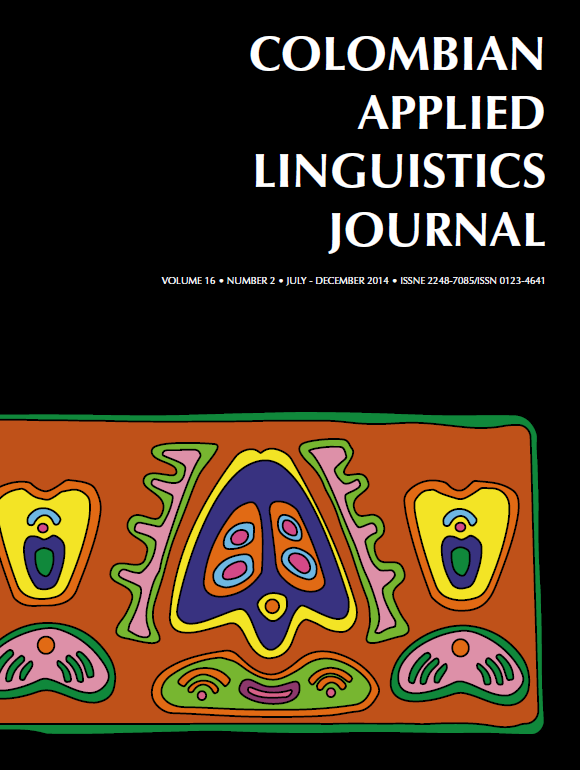DOI:
https://doi.org/10.14483/udistrital.jour.calj.2014.2.a06Published:
2014-09-22Issue:
Vol 16, No 2 (2014) July-DecemberSection:
Research ArticlesCollaborating and interacting: walking together towards our learning community
Colaboración e interacción: juntos en camino hacia nuestra comunidad de aprendizaje
Keywords:
colaboración, construcción de conocimiento, foros (es).Keywords:
Forums, Knowledge Construction, Online Collaboration. (en).Abstract (en)
This article presents the findings of a research study which aimed to explore the collaborative practices of a group of intermediate level students and the way in which students’ interactions contributed to the initial steps towards the establishment of a learning community. Collaboration in this particular study was seen as the actions students took in order to work together towards a common goal. Data revealed that participants went through a three-stage process that moved from individual perspectives to dialogic exchanges to collective constructions of knowledge that emerged from the community they initiated. As students participated in collaborative tasks, they progressively built closer relationships and their sense of belonging to the group progressively increased.
Abstract (es)
Este artículo presenta los hallazgos de una investigación cualitativa en la cual se exploraron las prácticas colaborativas de un grupo de estudiantes de nivel intermedio y como estas interacciones contribuyeron al inicio de una comunidad de aprendizaje. El concepto de colaboración representó las acciones tomadas para la realización colectiva de un producto objetivo. Los hallazgos revelaron un proceso de tres etapas en el cual los participantes pasaron de perspectivas individuales a intercambios dialógicos que resultaron en construcciones colectivas de conocimiento. Igualmente, a medida que los estudiantes tomaron parte en actividades colaborativas se establecieron relaciones más cercanas y el sentido de pertenencia al grupo se hizo más evidente en los participantes.
References
Beatty, K. (2003) Teaching and Researching: Computer-Assisted Language Learning. Great Britain: Longman.
---------------------------------------------------------------------------
Brookfield, S.D. (1987) Developing Critical Thinkers: Challenging Adults To Explore Alternative Ways of Thinking and Acting. San Francisco: Jossey-Bass.
---------------------------------------------------------------------------
Burns, A. (1999). Collaborative Action Research for English Language Teachers. Cambridge: Cambridge University Press.
---------------------------------------------------------------------------
Cabero, J. (2003). Principios pedagógicos, psicológicos y sociológicos del trabajo colaborativo: su proyección en la tele-enseñanza. 131 – 156. Barcelona: Paidós.
---------------------------------------------------------------------------
Charmaz, K. Constructing Grounded Theory: A Practical Guide Through Qualitative Analysis. Thousand Oaks, CA: Sage.
---------------------------------------------------------------------------
Clavijo, A. Hine, N, & Quintero, L. (2008). The Virtual Forum as an Alternative Way to Enhance Foreign Language Learning. PROFILE Issues in Teachers’ Professional Development, 9 (1). P. 219-236.
---------------------------------------------------------------------------
Department of Foreign Languages and Cultures. Universidad de La Sabana. (2011). Mision-Vision [URL]. Retrieved June 2011 from Universidad de La Sabana web page: http://www.unisabana.edu.co/unidades/departamento-de- lenguas-y-culturas/mision-vision/
---------------------------------------------------------------------------
Keller, J.M. (1987).Motivational Design in Encylopedia of Educational Media, Communications and Technology, 2nd edition. Wetsport, CT: Greenwood Press.
---------------------------------------------------------------------------
Montenegro, A. (2012) Analyzing EFL University Learners’ Positionings and Participation Structures in a Collaborative Learning Environment. Colombian Applied Linguistics Journal, 14 (1), 127 – 145.
---------------------------------------------------------------------------
Salmon, G. (2006). E-moderating: The key to teaching and learning online. London: Kogan Page. P. 29.
How to Cite
APA
ACM
ACS
ABNT
Chicago
Harvard
IEEE
MLA
Turabian
Vancouver
Download Citation
Metrics
License
This work is licensed under a Creative Commons Attribution-NonCommercial-NoDerivatives 4.0 International License.
Attribution — You must give appropriate credit, provide a link to the license, and indicate if changes were made. You may do so in any reasonable manner, but not in any way that suggests the licensor endorses you or your use.
NonCommercial — You may not use the material for commercial purposes.
NoDerivatives — If you remix, transform, or build upon the material, you may not distribute the modified material.
The journal allow the author(s) to hold the copyright without restrictions. Also, The Colombian Apllied Linguistics Journal will allow the author(s) to retain publishing rights without restrictions.









